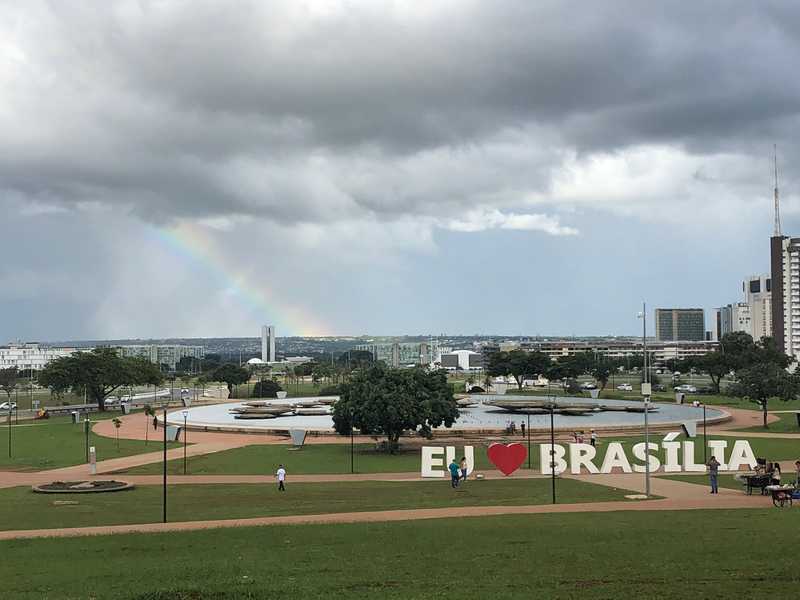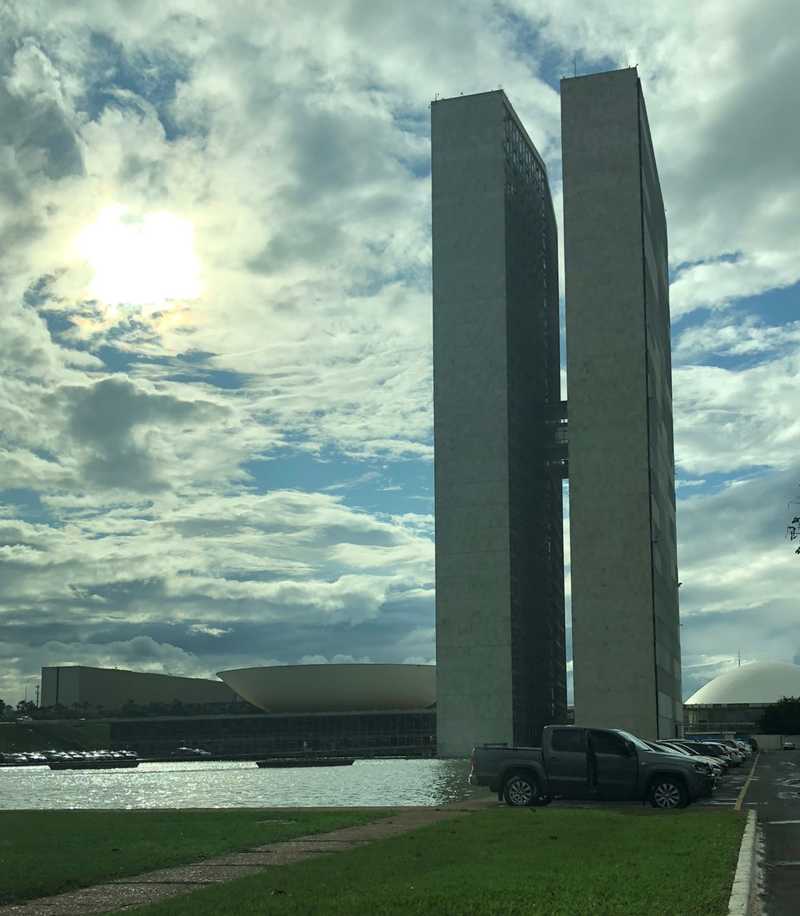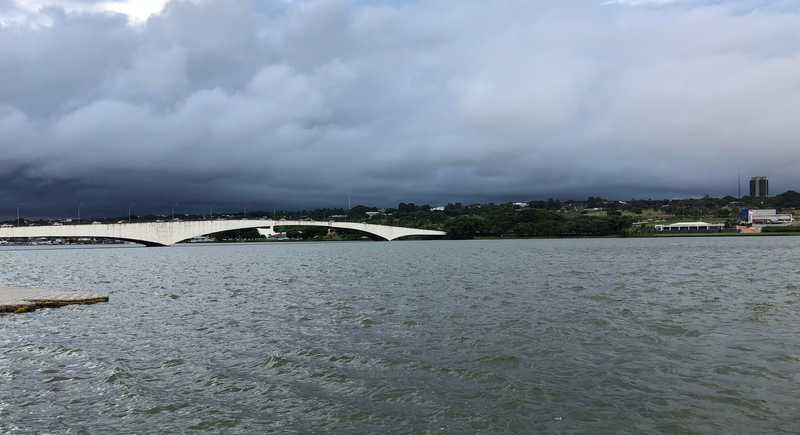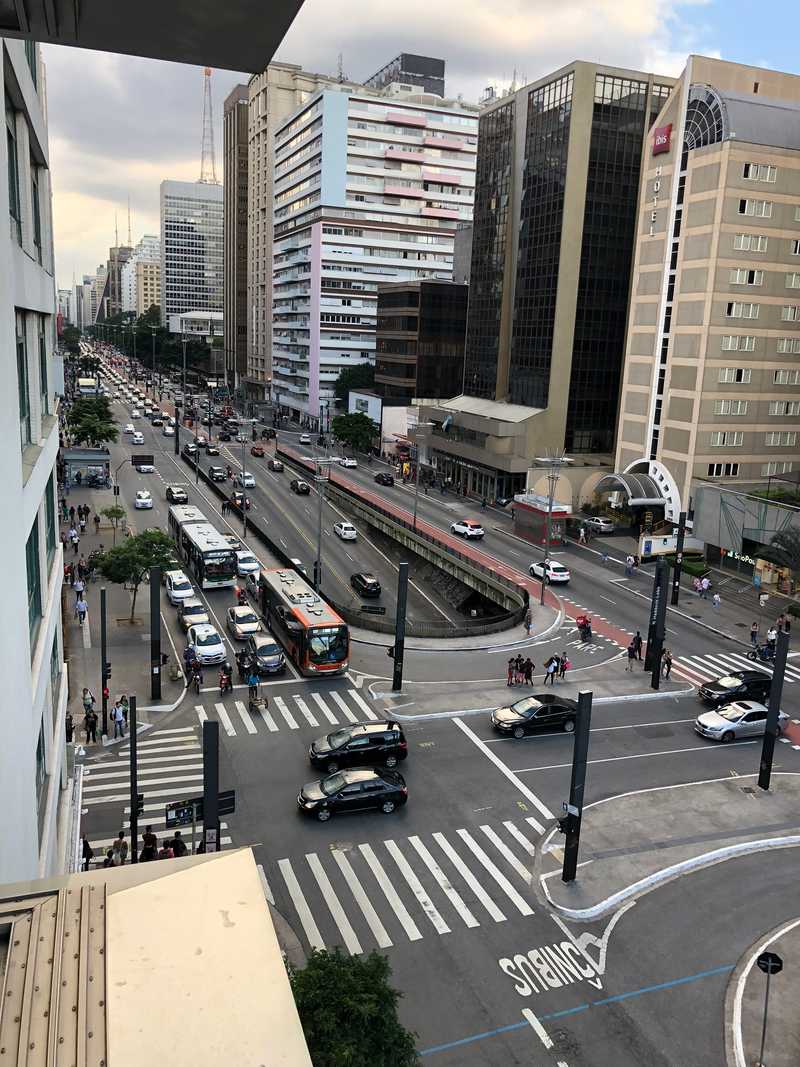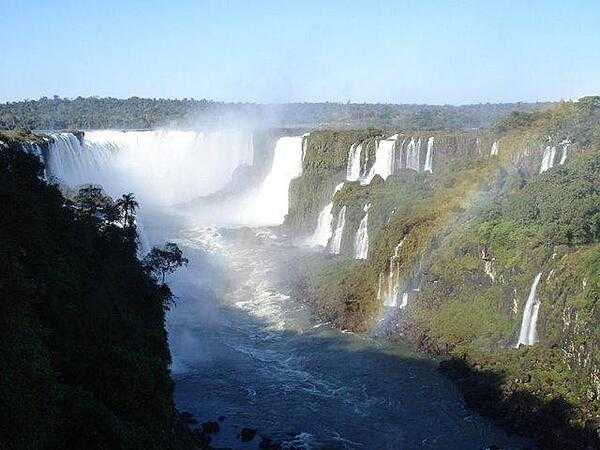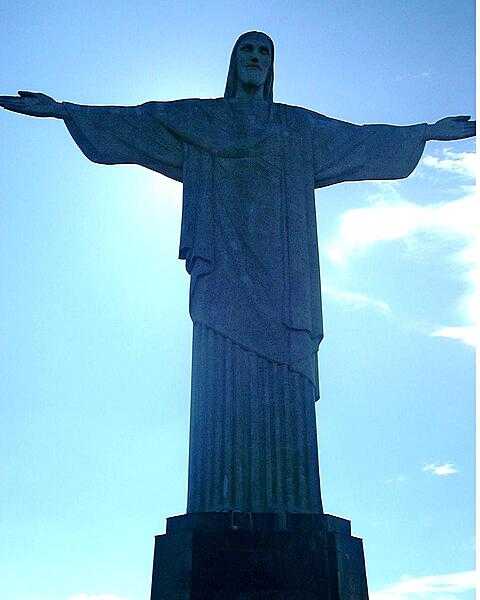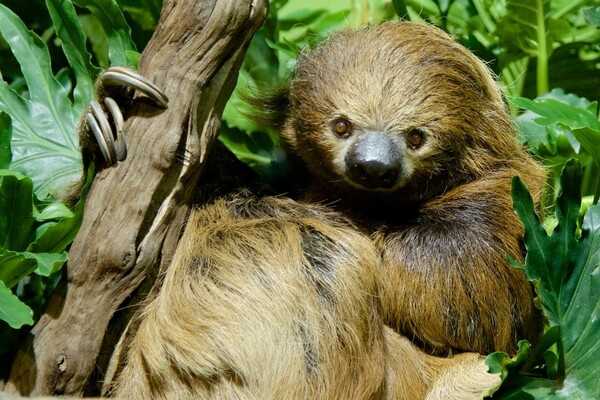Brazil - BR - BRA - BRA - South America
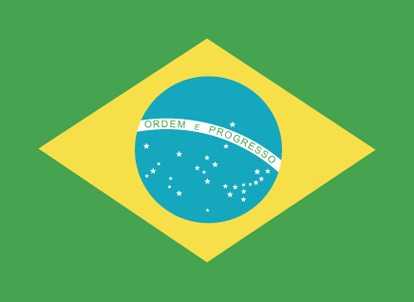
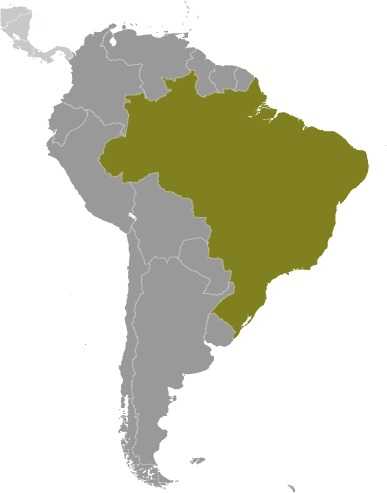
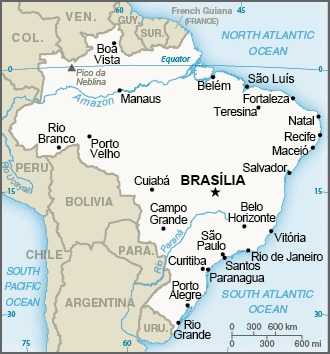
Brazil Images
Brazil Factbook Data
Diplomatic representation from the US
embassy: SES - Avenida das Nações, Quadra 801, Lote 03, 70403-900 - Brasília, DF
mailing address: 7500 Brasilia Place, Washington DC 20521-7500
telephone: [55] (61) 3312-7000
FAX: [55] (61) 3225-9136
email address and website:
BrasilliaACS@state.gov
https://br.usembassy.gov/
consulate(s) general: Recife, Porto Alegre, Rio de Janeiro, São Paulo
branch office(s): Belo Horizonte
Age structure
15-64 years: 69.5% (male 75,889,089/female 77,118,722)
65 years and over: 10.9% (2024 est.) (male 10,251,809/female 13,677,901)
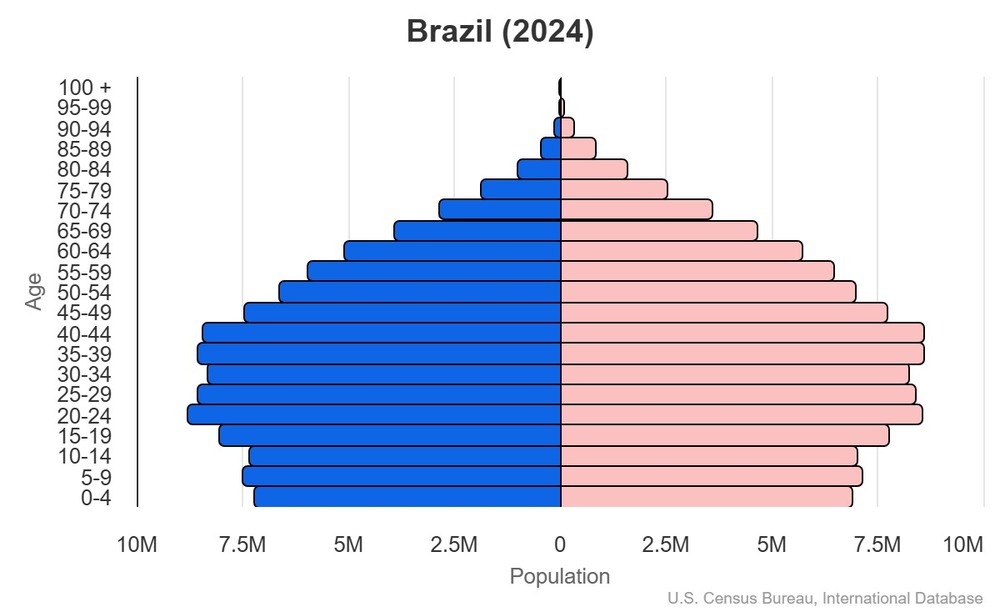
For additional information, please see the entry for Population pyramid on the Definitions and Notes page.
Geographic coordinates
Sex ratio
0-14 years: 1.04 male(s)/female
15-64 years: 0.98 male(s)/female
65 years and over: 0.75 male(s)/female
total population: 0.97 male(s)/female (2024 est.)
Natural hazards
Area - comparative
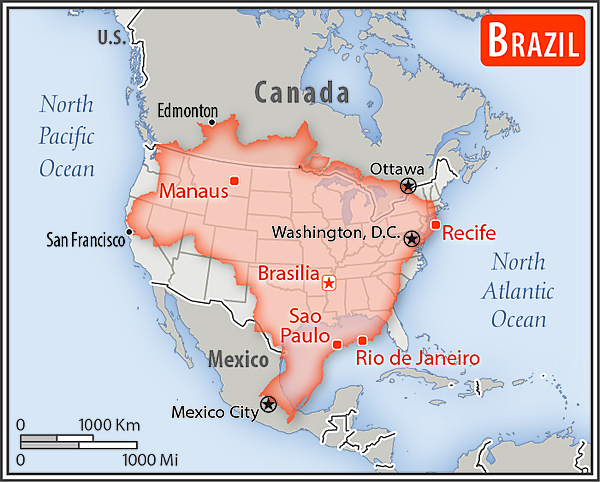
Military service age and obligation
note: in 2024, women were reported to comprise approximately 10% of the Brazilian military
Background
By far the largest and most populous country in South America, Brazil continues to pursue industrial and agricultural growth and development of its interior. Having successfully weathered a period of global financial difficulty in the late 20th century, Brazil was soon seen as one of the world's strongest emerging markets and a contributor to global growth under President Luiz Inácio LULA da Silva (2003-2010). The awarding of the 2014 FIFA World Cup and 2016 Summer Olympic Games -- the first ever to be held in South America -- to Brazil was symbolic of the country's rise. However, from about 2013 to 2016, Brazil was plagued by a sagging economy, high unemployment, and high inflation, only emerging from recession in 2017. Congress removed then-President Dilma ROUSSEFF (2011-2016) from office in 2016 for having committed impeachable acts against Brazil's budgetary laws, and her vice president, Michel TEMER, served the remainder of her second term. A money-laundering investigation, Operation Lava Jato, uncovered a vast corruption scheme and prosecutors charged several high-profile Brazilian politicians with crimes. Former President LULA was convicted of accepting bribes and served jail time (2018-19), although his conviction was overturned in 2021. LULA's revival became complete in 2022 when he narrowly defeated incumbent Jair BOLSONARO (2019-2022) in the presidential election. Positioning Brazil as an independent global leader on climate change and promoting sustainable development, LULA took on the 2024 G20 presidency, balancing the fight against deforestation with sustainable energy and other projects designed to alleviate poverty and promote economic growth, such as expanding fossil fuel exploration.
Environmental issues
International environmental agreements
signed, but not ratified: Marine Dumping-London Protocol
Military expenditures
1.1% of GDP (2023 est.)
1.2% of GDP (2022 est.)
1.3% of GDP (2021 est.)
1.4% of GDP (2020 est.)
Population below poverty line
note: approximately 4% of the population are below the "extreme" poverty line
Household income or consumption by percentage share
highest 10%: 40.8% (2023 est.)
note: % share of income accruing to lowest and highest 10% of population
Exports - commodities
note: top five export commodities based on value in dollars
Exports - partners
note: top five export partners based on percentage share of exports
Administrative divisions
Agricultural products
note: top ten agricultural products based on tonnage
Military and security forces
note: the three national police forces – the Federal Police, Federal Highway Police, and Federal Railway Police – have domestic security responsibilities and report to the Ministry of Justice and Public Security (Ministry of Justice)
Budget
expenditures: $706.816 billion (2023 est.)
note: central government revenues (excluding grants) and expenditures converted to US dollars at average official exchange rate for year indicated
Capital
geographic coordinates: 15 47 S, 47 55 W
time difference: UTC-3 (2 hours ahead of Washington, DC, during Standard Time)
time zone note: Brazil has four time zones, including one for the Fernando de Noronha Islands
etymology: the name is the Latinized form of the country name, bestowed on the new capital of Brazil in 1960; previous Brazilian capitals were Salvador (1549-1763) and Rio de Janeiro (1763 to 1960)
Imports - commodities
note: top five import commodities based on value in dollars
Climate
Coastline
Constitution
amendment process: proposed by at least one third of either house of the National Congress, by the president of the republic, or by simple majority vote by more than half of the state legislative assemblies; passage requires at least three-fifths majority vote by both houses in each of two readings; constitutional provisions affecting the federal form of government, separation of powers, suffrage, or individual rights and guarantees cannot be amended
Exchange rates
Exchange rates:
5.389 (2024 est.)
4.994 (2023 est.)
5.164 (2022 est.)
5.394 (2021 est.)
5.155 (2020 est.)
Executive branch
head of government: President Luiz Inácio LULA da Silva (since 1 January 2023)
cabinet: Cabinet appointed by the president
election/appointment process: president and vice president directly elected on the same ballot by absolute-majority popular vote in 2 rounds, if needed, for a 4-year term (eligible for a single consecutive term and additional terms after at least one term has elapsed)
most recent election date: 2 October 2022, with runoff on 30 October 2022
election results:
2022: Luiz Inácio LULA da Silva elected president in second round; percent of vote in first round - Luiz Inácio LULA da Silva (PT) 48.4%, Jair BOLSONARO (PSL) 43.2%, Simone Nassar TEBET (MDB) 4.2%, Ciro GOMES (PDT) 3%, other 1.2%; percent of vote in second round - Luiz Inácio LULA da Silva (PT) 50.9%, Jair BOLSONARO (PSL) 49.1%
2018: Jair BOLSONARO elected president in second round; percent of vote in first round - Jair BOLSONARO (PSL) 46%, Fernando HADDAD (PT) 29.3%, Ciro GOMEZ (PDT) 12.5%, Geraldo ALCKMIN (PSDB) 4.8%, other 7.4%; percent of vote in second round - Jair BOLSONARO (PSL) 55.1%, Fernando HADDAD (PT) 44.9%
expected date of next election: 4 October 2026
note: the president is both chief of state and head of government
Flag
meaning: green stands for the country's forests, and yellow for its mineral wealth, with the diamond representing the country's shape; the blue globe and stars depict the sky over Rio de Janeiro on the morning of 15 November 1889, the day the Republic of Brazil was declared; the number of stars has risen with the creation of new states, from 21 to 27 (one for each state and the Federal District)
history: the flag was inspired by the former Empire of Brazil's flag (1822-1889)
note: one of four national flags that reflect the shape of the country in the flag design; the others are Bosnia and Herzegovina, Eritrea, and Vanuatu
Illicit drugs
major precursor-chemical producer (2025)
Independence
Industries
Judicial branch
judge selection and term of office: justices appointed by the president and approved by absolute majority by the Federal Senate; justices appointed to serve until mandatory retirement at age 75
subordinate courts: Tribunal of the Union, Federal Appeals Court, Superior Court of Justice, Superior Electoral Court, regional federal courts; state court system
Land boundaries
border countries (10): Argentina 1,263 km; Bolivia 3,403 km; Colombia 1,790 km; French Guiana 649 km; Guyana 1,308 km; Paraguay 1,371 km; Peru 2,659 km; Suriname 515 km; Uruguay 1,050 km; Venezuela 2,137 km
Land use
arable land: 6.7% (2023 est.)
permanent crops: 0.9% (2023 est.)
permanent pasture: 20.7% (2023 est.)
forest: 58.9% (2023 est.)
other: 12.7% (2023 est.)
Legal system
note: a new civil-law code in 2002 replaced the 1916 code
Legislative branch
legislative structure: bicameral
Literacy
male: 94.5% (2024 est.)
female: 95.1% (2024 est.)
Maritime claims
contiguous zone: 24 nm
exclusive economic zone: 200 nm
continental shelf: 200 nm or to edge of the continental margin
International organization participation
National holiday
Nationality
adjective: Brazilian
Natural resources
Geography - note
note 2: Rocas Atoll, located off the northeast coast of Brazil, is the only atoll in the South Atlantic
Economic overview
upper-middle-income, largest Latin American economy; Mercosur, BRICS, G20 member and OECD accession candidate; growth driven by strong domestic consumption; monetary tightening helping curb inflation rate; high inequality in income and access to health and education
Political parties
Avante (formerly Labor Party of Brazil or PTdoB)
Brazil Union (União Brasil); note - founded from a merger between the Democrats (DEM) and the Social Liberal Party (PSL)
Brazilian Communist Party or PCB
Brazilian Democratic Movement or MDB
Brazilian Labor Party or PTB
Brazilian Renewal Labor Party or PRTB
Brazilian Labor Party or PTB
Brazilian Social Democracy Party or PSDB
Brazilian Socialist Party or PSB
Christian Democracy or DC (formerly Christian Social Democratic Party)
Cidadania (formerly Popular Socialist Party or PPS)
Communist Party of Brazil or PCdoB
Democratic Labor Party or PDT
Democratic Party or PSDC
Democrats or DEM (formerly Liberal Front Party or PFL); note - dissolved in February 2022
Green Party or PV
Liberal Party or PL [Valdemar Costa Neto] (formerly Party of the Republic or PR)
National Mobilization Party or PMN
New Party or NOVO
Patriota (formerly National Ecologic Party or PEN)
Podemos (formerly National Labor Party or PTN)
Progressive Party (Progressistas) or PP
Republican Social Order Party or PROS
Republicans (Republicanos) (formerly Brazilian Republican Party or PRB)
Social Christian Party or PSC
Social Democratic Party or PSD
Social Liberal Party or PSL
Socialism and Freedom Party or PSOL
Solidarity or SD
Sustainability Network or REDE
United Socialist Workers' Party or PSTU
Workers' Cause Party or PCO
Workers' Party or PT
Railways
standard gauge: 194 km (2014) 1.435-m gauge
narrow gauge: 23,341.6 km (2014) 1.000-m gauge (24 km electrified)
broad gauge: 5,822.3 km (2014) 1.600-m gauge (498.3 km electrified)
dual gauge: 492 km (2014) 1.600-1.000-m gauge
Suffrage
note: military conscripts by law cannot vote
Terrain
Government type
Country name
conventional short form: Brazil
local long form: República Federativa do Brasil
local short form: Brasil
etymology: the country name derives from the brazil tree that used to grow plentifully along the coast of Brazil and that was used to produce a deep red dye
Location
Map references
Irrigated land
Diplomatic representation in the US
chancery: 3006 Massachusetts Avenue NW, Washington, DC 20008
telephone: [1] (202) 238-2700
FAX: [1] (202) 238-2827
email address and website:
contact.washington@itamaraty.gov.br
https://www.gov.br/mre/pt-br/embaixada-washington
consulate(s) general: Atlanta, Boston, Chicago, Hartford (CT), Houston, Los Angeles, Miami, New York, Orlando, San Francisco
Internet users
Internet country code
Refugees and internally displaced persons
IDPs: 19,043 (2024 est.)
stateless persons: 27 (2024 est.)
GDP (official exchange rate)
note: data in current dollars at official exchange rate
Total renewable water resources
School life expectancy (primary to tertiary education)
male: 15 years (2022 est.)
female: 17 years (2022 est.)
Urbanization
rate of urbanization: 0.87% annual rate of change (2020-25 est.)
Broadcast media
Drinking water source
urban: 99.8% of population (2022 est.)
rural: 98% of population (2022 est.)
total: 99.6% of population (2022 est.)
unimproved:
urban: 0.2% of population (2022 est.)
rural: 2% of population (2022 est.)
total: 0.4% of population (2022 est.)
National anthem(s)
lyrics/music: Joaquim Osorio Duque ESTRADA/Francisco Manoel DA SILVA
history: music adopted 1890, lyrics adopted 1922; the anthem's music, composed in 1822, was used unofficially for many years
Major urban areas - population
International law organization participation
Physician density
Hospital bed density
National symbol(s)
GDP - composition, by end use
government consumption: 18.8% (2024 est.)
investment in fixed capital: 17% (2024 est.)
investment in inventories: -0.1% (2024 est.)
exports of goods and services: 18% (2024 est.)
imports of goods and services: -17.5% (2024 est.)
note: figures may not total 100% due to rounding or gaps in data collection
Citizenship
citizenship by descent only: yes
dual citizenship recognized: yes
residency requirement for naturalization: 4 years
Population distribution
Electricity access
electrification - urban areas: 100%
electrification - rural areas: 97.3%
Civil aircraft registration country code prefix
Sanitation facility access
urban: 94.7% of population (2022 est.)
rural: 65% of population (2022 est.)
total: 91% of population (2022 est.)
unimproved:
urban: 5.3% of population (2022 est.)
rural: 35% of population (2022 est.)
total: 9% of population (2022 est.)
Ethnic groups
Religions
Languages
major-language sample(s):
O Livro de Fatos Mundiais, a fonte indispensável para informação básica. (Brazilian Portuguese)
The World Factbook, the indispensable source for basic information.
Imports - partners
note: top five import partners based on percentage share of imports
Elevation
lowest point: Atlantic Ocean 0 m
mean elevation: 320 m
Health expenditure
9% of national budget (2022 est.)
Military - note
Brazil has Major Non-NATO Ally (MNNA) status with the US, a designation under US law that provides foreign partners with certain benefits in the areas of defense trade and security cooperation
the origins of Brazil's military stretch back to the 1640s; Brazil provided a 25,000-man expeditionary force with air and ground units to fight with the Allies in the Mediterranean Theater during World War II; the Navy participated in the Battle of the Atlantic (2025)
Military and security service personnel strengths
Military equipment inventories and acquisitions
Total water withdrawal
industrial: 10.2 billion cubic meters (2022)
agricultural: 41.336 billion cubic meters (2022)
Waste and recycling
percent of municipal solid waste recycled: 2.8% (2022 est.)
Average household expenditures
on alcohol and tobacco: 1.7% of household expenditures (2023 est.)
Trafficking in persons
National heritage
selected World Heritage Site locales:
Brasilia (c); Historic Salvador de Bahia (c); Historic Ouro Preto (c); Historic Center of the Town of Olinda (c); Iguaçu National Park (n); Jesuit Missions of the Guaranis (c); Rio de Janeiro: Carioca Landscapes (c); Central Amazon Conservation Complex (n); Atlantic Forest South-East Reserves (n); Historic Center of Salvador de Bahia (c); Sanctuary of Bom Jesus do Congonhas (c ); Brasilia (c ); Serra da Capivara National Park (c ); Historic Center of Sao Luis( c); Discovery Coast Atlantic Forest Reserves (n); Historic Center of the Town of Diamantina (c ); Pantanal Conservation Area (n); Brazilian Atlantic Islands: Fernando de Noronha and Atol das Rocas Reserves (n); Cerrado Protected Areas: Chapada dos Veadeiros and Emas National Parks (n); Historic Centre of the Town of Goiás (c); São Francisco Square in the Town of São Cristóvão (c ); Rio de Janeiro: Carioca Landscapes between the Mountain and the Sea (c ); Pampulha Modern Ensemble (c ); Valongo Wharf Archaeological Site (c ); Paraty and Ilha Grande – Culture and Biodiversity (m); Sítio Roberto Burle Marx (c ); Lençóis Maranhenses National Park (n);Peruaçu River Canyon (n)
Major aquifers
Major watersheds (area sq km)
Major lakes (area sq km)
salt water lake(s): Lagoa Mirim (shared with Uruguay) - 2,970 sq km
Major rivers (by length in km)
note: [s] after country name indicates river source; [m] after country name indicates river mouth
Coal
consumption: 32.223 million metric tons (2023 est.)
exports: 5,000 metric tons (2023 est.)
imports: 18.257 million metric tons (2023 est.)
proven reserves: 6.596 billion metric tons (2023 est.)
Electricity generation sources
nuclear: 2.1% of total installed capacity (2023 est.)
solar: 6.9% of total installed capacity (2023 est.)
wind: 13.5% of total installed capacity (2023 est.)
hydroelectricity: 60.2% of total installed capacity (2023 est.)
biomass and waste: 8.3% of total installed capacity (2023 est.)
Natural gas
consumption: 29.065 billion cubic meters (2023 est.)
exports: 101.203 million cubic meters (2023 est.)
imports: 6.356 billion cubic meters (2023 est.)
proven reserves: 363.985 billion cubic meters (2021 est.)
Petroleum
refined petroleum consumption: 3.163 million bbl/day (2023 est.)
crude oil estimated reserves: 12.715 billion barrels (2021 est.)
Terrorist group(s)
note: details about the history, aims, leadership, organization, areas of operation, tactics, targets, weapons, size, and sources of support of the group(s) appear(s) in the Terrorism reference guide
Gross reproduction rate
Currently married women (ages 15-49)
Remittances
0.2% of GDP (2023 est.)
0.3% of GDP (2022 est.)
note: personal transfers and compensation between resident and non-resident individuals/households/entities
Nuclear energy
Number of nuclear reactors under construction: 1 (2025)
Net capacity of operational nuclear reactors: 1.88GW (2025 est.)
Percent of total electricity production: 2.2% (2023 est.)
Space program overview
Space agency/agencies
Space launch site(s)
Geoparks
global geoparks and regional networks: Araripe; Cacapava; Quarta Colonia; Serido; Southern Canyons Pathways; Uberaba (2024)
Ports
large: 4
medium: 7
small: 19
very small: 15
ports with oil terminals: 31
key ports: Belem, DTSE/Gegua Oil Terminal, Itajai, Port de Salvador, Porto Alegre, Recife, Rio de Janeiro, Rio Grande, Santos, Tubarao, Vitoria
Legislative branch - lower chamber
number of seats: 513 (all directly elected)
electoral system: proportional representation
scope of elections: full renewal
term in office: 4 years
most recent election date: 10/2/2022
parties elected and seats per party: Liberal Party (PL) (99); Workers' Party (PT) (69); Brazil Union (União) (59); Progressive Party (PP) (47); Brazilian Democratic Movement (MDB) (42); Social Democratic Party (PSD) (42); Republicans (Republicanos) (40); Other (106)
percentage of women in chamber: 18.1%
expected date of next election: October 2026
Legislative branch - upper chamber
number of seats: 81 (all directly elected)
electoral system: plurality/majority
scope of elections: partial renewal
term in office: 8 years
most recent election date: 10/2/2022
parties elected and seats per party: Liberal Party (PL) (8); Brazil Union (União) (5); Workers' Party (PT) (4); Progressive Party (PP) (3); Social Democratic Party (PSD) (2); Republicans (Republicanos) (2); Other (3)
percentage of women in chamber: 19.8%
expected date of next election: October 2026
National color(s)
Key space-program milestones
1984 - began satellite launch vehicle (SLV) program (Veículo Lançador de Satélites or VLS-1)
1985 - first communications satellite jointly produced with Canada and launched on European SLV
1993 - first domestically built experimental communications satellite (Satélite de Coleta de Dados, SCD-1) launched by US
2004 - launched a sounding rocket into sub-orbital space, but the subsequent catastrophic failure of a VLS-1 during a test launch led to scaling back the program
2006 - first Brazilian astronaut to the International Space Station on a Russian rocket
2008 - began work on a 3-stage microsatellite launch vehicle (Veículo Lançador de Microssatélite or VLM-1) in partnership with Germany
2021 - first independently produced remote sensing (RS) satellite (Amazonia-1) launched by India; signed US-led Artemis Accords on space exploration cooperation and signed cooperation agreements with the space agencies of China, India, Russia, and South Africa for the joint development of an RS satellite constellation
2022 - successfully launched suborbital rocket more than 225 km (140 miles) in height
Particulate matter emissions
Methane emissions
agriculture: 13,761.9 kt (2019-2021 est.)
waste: 3,361.8 kt (2019-2021 est.)
other: 382.6 kt (2019-2021 est.)
Labor force
note: number of people ages 15 or older who are employed or seeking work
Youth unemployment rate (ages 15-24)
male: 15.7% (2024 est.)
female: 20.9% (2024 est.)
note: % of labor force ages 15-24 seeking employment
Net migration rate
Median age
male: 34 years
female: 36.1 years
Debt - external
note: present value of external debt in current US dollars
Maternal mortality ratio
Reserves of foreign exchange and gold
$355.021 billion (2023 est.)
$324.673 billion (2022 est.)
note: holdings of gold (year-end prices)/foreign exchange/special drawing rights in current dollars
Public debt
note: central government debt as a % of GDP
Total fertility rate
Unemployment rate
8% (2023 est.)
9.3% (2022 est.)
note: % of labor force seeking employment
Carbon dioxide emissions
from coal and metallurgical coke: 53.664 million metric tonnes of CO2 (2023 est.)
from petroleum and other liquids: 331.079 million metric tonnes of CO2 (2023 est.)
from consumed natural gas: 53.026 million metric tonnes of CO2 (2023 est.)
Area
land: 8,358,140 sq km
water: 157,630 sq km
note: includes Arquipelago de Fernando de Noronha, Atol das Rocas, Ilha da Trindade, Ilhas Martin Vaz, and Penedos de Sao Pedro e Sao Paulo
Taxes and other revenues
note: central government tax revenue as a % of GDP
Real GDP (purchasing power parity)
$4.029 trillion (2023 est.)
$3.902 trillion (2022 est.)
note: data in 2021 dollars
Airports
Infant mortality rate
male: 14.6 deaths/1,000 live births
female: 11.1 deaths/1,000 live births
Gini Index coefficient - distribution of family income
note: index (0-100) of income distribution; higher values represent greater inequality
Inflation rate (consumer prices)
4.6% (2023 est.)
9.3% (2022 est.)
note: annual % change based on consumer prices
Current account balance
-$27.933 billion (2023 est.)
-$42.157 billion (2022 est.)
note: balance of payments - net trade and primary/secondary income in current dollars
Real GDP per capita
$19,100 (2023 est.)
$18,600 (2022 est.)
note: data in 2021 dollars
Broadband - fixed subscriptions
subscriptions per 100 inhabitants: 23 (2023 est.)
Tobacco use
male: 14.4% (2025 est.)
female: 8.3% (2025 est.)
Obesity - adult prevalence rate
Energy consumption per capita
Death rate
Birth rate
Electricity
consumption: 608.451 billion kWh (2023 est.)
exports: 7.186 billion kWh (2023 est.)
imports: 22.294 billion kWh (2023 est.)
transmission/distribution losses: 106.916 billion kWh (2023 est.)
Merchant marine
by type: bulk carrier 13, container ship 20, general cargo 38, oil tanker 27, other 790
Children under the age of 5 years underweight
Imports
$340.195 billion (2023 est.)
$369.861 billion (2022 est.)
note: balance of payments - imports of goods and services in current dollars
Exports
$389.192 billion (2023 est.)
$380.492 billion (2022 est.)
note: balance of payments - exports of goods and services in current dollars
Heliports
Alcohol consumption per capita
beer: 3.84 liters of pure alcohol (2019 est.)
wine: 0.24 liters of pure alcohol (2019 est.)
spirits: 2 liters of pure alcohol (2019 est.)
other alcohols: 0.04 liters of pure alcohol (2019 est.)
Life expectancy at birth
male: 72.6 years
female: 80.1 years
Real GDP growth rate
3.2% (2023 est.)
3% (2022 est.)
note: annual GDP % growth based on constant local currency
Industrial production growth rate
note: annual % change in industrial value added based on constant local currency
GDP - composition, by sector of origin
industry: 21.3% (2024 est.)
services: 59.3% (2024 est.)
note: figures may not total 100% due to non-allocated consumption not captured in sector-reported data
Education expenditure
12.9% national budget (2022 est.)
Population growth rate
Telephones - mobile cellular
subscriptions per 100 inhabitants: 102 (2024 est.)
Dependency ratios
youth dependency ratio: 28.1 (2025 est.)
elderly dependency ratio: 16.2 (2025 est.)
potential support ratio: 6.2 (2025 est.)
Population
male: 108,753,532
female: 112,605,855
Telephones - fixed lines
subscriptions per 100 inhabitants: 11 (2024 est.)

